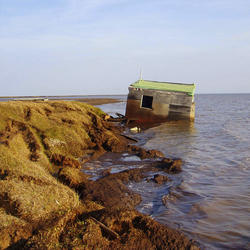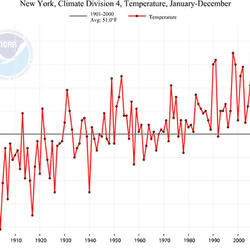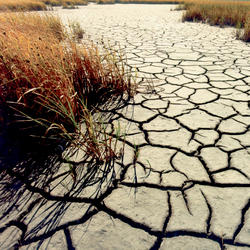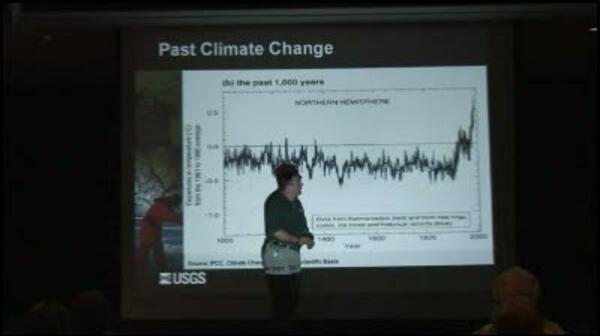USGS scientist Erich Peitzsch does repair on the Sperry Weather Station in Glacier National Park. Information gathered by the USGS managed Sperry Weather Station are being used by regional fire managers to forecast fire weather and future fire behavior during the 2017 fire season.
What is the difference between weather and climate change?
Weather refers to short term atmospheric conditions while climate is the weather of a specific region averaged over a long period of time. Climate change refers to long-term changes.
Related Content
Could a large Yellowstone eruption significantly change the climate?
If another catastrophic, caldera-forming Yellowstone eruption were to occur, it would probably alter global weather patterns and have enormous impacts on human activity (especially agricultural production) for many years. At this time, however, scientists do not have the ability to predict specific consequences or durations of possible global impacts from such large eruptions. The 1991 eruption of...
Do volcanoes affect weather?
Yes, volcanoes can affect weather and the Earth's climate. Following the 1991 eruption of Mount Pinatubo in the Philippines, cooler than normal temperatures were recorded worldwide and brilliant sunsets and sunrises were attributed to this eruption that sent fine ash and gases high into the stratosphere, forming a large volcanic cloud that drifted around the world. The sulfur dioxide (SO2) in this...
Is there earthquake weather?
In the 4th Century B.C., Aristotle proposed that earthquakes were caused by winds trapped in subterranean caves. Small tremors were thought to have been caused by air pushing on the cavern roofs, and large ones by the air breaking the surface. This theory lead to a belief in earthquake weather, that because a large amount of air was trapped underground, the weather would be hot and calm before an...
What are the long-term effects of climate change?
Scientists have predicted that long-term effects of climate change will include a decrease in sea ice and an increase in permafrost thawing, an increase in heat waves and heavy precipitation, and decreased water resources in semi-arid regions. Below are some of the regional impacts of global change forecast by the Intergovernmental Panel on Climate Change: North America: Decreasing snowpack in the...
How can climate change affect natural disasters?
With increasing global surface temperatures the possibility of more droughts and increased intensity of storms will likely occur. As more water vapor is evaporated into the atmosphere it becomes fuel for more powerful storms to develop. More heat in the atmosphere and warmer ocean surface temperatures can lead to increased wind speeds in tropical storms. Rising sea levels expose higher locations...
How do changes in climate and land use relate to one another?
The link between land use and the climate is complex. First, land cover--as shaped by land use practices--affects the global concentration of greenhouse gases. Second, while land use change is an important driver of climate change, a changing climate can lead to changes in land use and land cover. For example, farmers might shift from their customary crops to crops that will have higher economic...
How do we know the climate is changing?
The scientific community is certain that the Earth's climate is changing because of the trends that we see in the instrumented climate record and the changes that have been observed in physical and biological systems. The instrumental record of climate change is derived from thousands of temperature and precipitation recording stations around the world. We have very high confidence in these...
Why is climate change happening and what are the causes?
There are many “natural” and “anthropogenic” (human-induced) factors that contribute to climate change. Climate change has always happened on Earth, which is clearly seen in the geological record; it is the rapid rate and the magnitude of climate change occurring now that is of great concern worldwide. Greenhouse gases in the atmosphere absorb heat radiation. Human activity has increased...
What is the difference between global warming and climate change?
Although people tend to use these terms interchangeably, global warming is just one aspect of climate change. “Global warming” refers to the rise in global temperatures due mainly to the increasing concentrations of greenhouse gases in the atmosphere. “Climate change” refers to the increasing changes in the measures of climate over a long period of time – including precipitation, temperature, and...
What are some of the signs of climate change?
• Temperatures are rising world-wide due to greenhouse gases trapping more heat in the atmosphere. • Droughts are becoming longer and more extreme around the world. • Tropical storms becoming more severe due to warmer ocean water temperatures. • As temperatures rise there is less snowpack in mountain ranges and polar areas and the snow melts faster. • Overall, glaciers are melting at a faster rate...
Does the USGS monitor global warming?
Not specifically. Our charge is to understand characteristics of the Earth, especially the Earth's surface, that affect our Nation's land, water, and biological resources. That includes quite a bit of environmental monitoring. Other agencies, especially NOAA and NASA, are specifically funded to monitor global temperature and atmospheric phenomena such as ozone concentrations. The work through...

USGS scientist Erich Peitzsch does repair on the Sperry Weather Station in Glacier National Park. Information gathered by the USGS managed Sperry Weather Station are being used by regional fire managers to forecast fire weather and future fire behavior during the 2017 fire season.

USGS staff ski to and from the Garden Wall weather station in Glacier National Park (elev. 7400 feet) to complete maintenance and examine the snowpack for avalanche research.
USGS staff ski to and from the Garden Wall weather station in Glacier National Park (elev. 7400 feet) to complete maintenance and examine the snowpack for avalanche research.
Climate change is an issue of increasing public concern because of its potential effects on land, water, and biological resources.
Climate change is an issue of increasing public concern because of its potential effects on land, water, and biological resources.
 USGS Public Lecture Series: Watching Nature's Clock: A Citizen-Scientist Effort to Track Seasonal Signs of Climate Change
USGS Public Lecture Series: Watching Nature's Clock: A Citizen-Scientist Effort to Track Seasonal Signs of Climate Change
USGS Public Lecture Series: Watching Nature's Clock: A Citizen-Scientist Effort to Track Seasonal Signs of Climate Change
linkA new USGS program, the USA National Phenology Network, is recruiting tens of thousands of volunteers to team up with scientists to help track the effects of climate on seasonal patterns of plant and animal behavior.
USGS Public Lecture Series: Watching Nature's Clock: A Citizen-Scientist Effort to Track Seasonal Signs of Climate Change
linkA new USGS program, the USA National Phenology Network, is recruiting tens of thousands of volunteers to team up with scientists to help track the effects of climate on seasonal patterns of plant and animal behavior.
Weather Station on Tern Island in the middle of Crump Lake protected by bird spikes.
Weather Station on Tern Island in the middle of Crump Lake protected by bird spikes.
Ecosystem vulnerability to climate change in the southeastern United States
Improved ground-based remote-sensing systems help monitor plant response to climate and other changes
Developing integrated methods to address complex resource and environmental issues
USGS Arctic Science Strategy
Climate change: evaluating your local and regional water resources
Changing Arctic ecosystems: sea ice decline, permafrost thaw, and benefits for geese
The U.S. Geological Survey Climate Geo Data Portal: an integrated broker for climate and geospatial data
DOI Climate Science Centers--Regional science to address management priorities
Why Study Paleoclimate?
Related Content
- FAQ
Could a large Yellowstone eruption significantly change the climate?
If another catastrophic, caldera-forming Yellowstone eruption were to occur, it would probably alter global weather patterns and have enormous impacts on human activity (especially agricultural production) for many years. At this time, however, scientists do not have the ability to predict specific consequences or durations of possible global impacts from such large eruptions. The 1991 eruption of...
Do volcanoes affect weather?
Yes, volcanoes can affect weather and the Earth's climate. Following the 1991 eruption of Mount Pinatubo in the Philippines, cooler than normal temperatures were recorded worldwide and brilliant sunsets and sunrises were attributed to this eruption that sent fine ash and gases high into the stratosphere, forming a large volcanic cloud that drifted around the world. The sulfur dioxide (SO2) in this...
Is there earthquake weather?
In the 4th Century B.C., Aristotle proposed that earthquakes were caused by winds trapped in subterranean caves. Small tremors were thought to have been caused by air pushing on the cavern roofs, and large ones by the air breaking the surface. This theory lead to a belief in earthquake weather, that because a large amount of air was trapped underground, the weather would be hot and calm before an...
What are the long-term effects of climate change?
Scientists have predicted that long-term effects of climate change will include a decrease in sea ice and an increase in permafrost thawing, an increase in heat waves and heavy precipitation, and decreased water resources in semi-arid regions. Below are some of the regional impacts of global change forecast by the Intergovernmental Panel on Climate Change: North America: Decreasing snowpack in the...
How can climate change affect natural disasters?
With increasing global surface temperatures the possibility of more droughts and increased intensity of storms will likely occur. As more water vapor is evaporated into the atmosphere it becomes fuel for more powerful storms to develop. More heat in the atmosphere and warmer ocean surface temperatures can lead to increased wind speeds in tropical storms. Rising sea levels expose higher locations...
How do changes in climate and land use relate to one another?
The link between land use and the climate is complex. First, land cover--as shaped by land use practices--affects the global concentration of greenhouse gases. Second, while land use change is an important driver of climate change, a changing climate can lead to changes in land use and land cover. For example, farmers might shift from their customary crops to crops that will have higher economic...
How do we know the climate is changing?
The scientific community is certain that the Earth's climate is changing because of the trends that we see in the instrumented climate record and the changes that have been observed in physical and biological systems. The instrumental record of climate change is derived from thousands of temperature and precipitation recording stations around the world. We have very high confidence in these...
Why is climate change happening and what are the causes?
There are many “natural” and “anthropogenic” (human-induced) factors that contribute to climate change. Climate change has always happened on Earth, which is clearly seen in the geological record; it is the rapid rate and the magnitude of climate change occurring now that is of great concern worldwide. Greenhouse gases in the atmosphere absorb heat radiation. Human activity has increased...
What is the difference between global warming and climate change?
Although people tend to use these terms interchangeably, global warming is just one aspect of climate change. “Global warming” refers to the rise in global temperatures due mainly to the increasing concentrations of greenhouse gases in the atmosphere. “Climate change” refers to the increasing changes in the measures of climate over a long period of time – including precipitation, temperature, and...
What are some of the signs of climate change?
• Temperatures are rising world-wide due to greenhouse gases trapping more heat in the atmosphere. • Droughts are becoming longer and more extreme around the world. • Tropical storms becoming more severe due to warmer ocean water temperatures. • As temperatures rise there is less snowpack in mountain ranges and polar areas and the snow melts faster. • Overall, glaciers are melting at a faster rate...
Does the USGS monitor global warming?
Not specifically. Our charge is to understand characteristics of the Earth, especially the Earth's surface, that affect our Nation's land, water, and biological resources. That includes quite a bit of environmental monitoring. Other agencies, especially NOAA and NASA, are specifically funded to monitor global temperature and atmospheric phenomena such as ozone concentrations. The work through...
- Multimedia
USGS scientist doing weather station repairs in Glacier National Park.USGS scientist doing weather station repairs in Glacier National Park.USGS scientist doing weather station repairs in Glacier National Park.
USGS scientist Erich Peitzsch does repair on the Sperry Weather Station in Glacier National Park. Information gathered by the USGS managed Sperry Weather Station are being used by regional fire managers to forecast fire weather and future fire behavior during the 2017 fire season.
USGS scientist Erich Peitzsch does repair on the Sperry Weather Station in Glacier National Park. Information gathered by the USGS managed Sperry Weather Station are being used by regional fire managers to forecast fire weather and future fire behavior during the 2017 fire season.
USGS staff ski to and from the Garden Wall weather station.USGS staff ski to and from the Garden Wall weather station.USGS staff ski to and from the Garden Wall weather station.USGS staff ski to and from the Garden Wall weather station in Glacier National Park (elev. 7400 feet) to complete maintenance and examine the snowpack for avalanche research.
USGS staff ski to and from the Garden Wall weather station in Glacier National Park (elev. 7400 feet) to complete maintenance and examine the snowpack for avalanche research.
USGS Public Lecture Series: Climate Change 101Climate change is an issue of increasing public concern because of its potential effects on land, water, and biological resources.
Climate change is an issue of increasing public concern because of its potential effects on land, water, and biological resources.
 USGS Public Lecture Series: Watching Nature's Clock: A Citizen-Scientist Effort to Track Seasonal Signs of Climate Change
USGS Public Lecture Series: Watching Nature's Clock: A Citizen-Scientist Effort to Track Seasonal Signs of Climate ChangeUSGS Public Lecture Series: Watching Nature's Clock: A Citizen-Scientist Effort to Track Seasonal Signs of Climate Change
USGS Public Lecture Series: Watching Nature's Clock: A Citizen-Scientist Effort to Track Seasonal Signs of Climate Change
USGS Public Lecture Series: Watching Nature's Clock: A Citizen-Scientist Effort to Track Seasonal Signs of Climate ChangeUSGS Public Lecture Series: Watching Nature's Clock: A Citizen-Scientist Effort to Track Seasonal Signs of Climate ChangeUSGS Public Lecture Series: Watching Nature's Clock: A Citizen-Scientist Effort to Track Seasonal Signs of Climate Change
linkA new USGS program, the USA National Phenology Network, is recruiting tens of thousands of volunteers to team up with scientists to help track the effects of climate on seasonal patterns of plant and animal behavior.
USGS Public Lecture Series: Watching Nature's Clock: A Citizen-Scientist Effort to Track Seasonal Signs of Climate Change
linkA new USGS program, the USA National Phenology Network, is recruiting tens of thousands of volunteers to team up with scientists to help track the effects of climate on seasonal patterns of plant and animal behavior.
Remote Weather StationWeather Station on Tern Island in the middle of Crump Lake protected by bird spikes.
Weather Station on Tern Island in the middle of Crump Lake protected by bird spikes.
- Publications
Ecosystem vulnerability to climate change in the southeastern United States
Two recent investigations of climate-change vulnerability for 19 terrestrial, aquatic, riparian, and coastal ecosystems of the southeastern United States have identified a number of important considerations, including potential for changes in hydrology, disturbance regimes, and interspecies interactions. Complementary approaches using geospatial analysis and literature synthesis integrated informaAuthorsJennifer M. Cartwright, Jennifer CostanzaImproved ground-based remote-sensing systems help monitor plant response to climate and other changes
Scientists at the U.S. Geological Survey are improving and developing new ground-based remote-sensing instruments and techniques to study how Earth’s vegetation responds to changing climates. Do seasonal grasslands and forests “green up” early (or late) and grow more (or less) during unusually warm years? How do changes in temperature and precipitation affect these patterns? Innovations in ground-AuthorsDennis G. Dye, Rian BogleDeveloping integrated methods to address complex resource and environmental issues
IntroductionThis circular provides an overview of selected activities that were conducted within the U.S. Geological Survey (USGS) Integrated Methods Development Project, an interdisciplinary project designed to develop new tools and conduct innovative research requiring integration of geologic, geophysical, geochemical, and remote-sensing expertise. The project was supported by the USGS Mineral RUSGS Arctic Science Strategy
The United States is one of eight Arctic nations responsible for the stewardship of a polar region undergoing dramatic environmental, social, and economic changes. Although warming and cooling cycles have occurred over millennia in the Arctic region, the current warming trend is unlike anything recorded previously and is affecting the region faster than any other place on Earth, bringing dramaticAuthorsMark Shasby, Durelle SmithClimate change: evaluating your local and regional water resources
The BCM is a fine-scale hydrologic model that uses detailed maps of soils, geology, topography, and transient monthly or daily maps of potential evapotranspiration, air temperature, and precipitation to generate maps of recharge, runoff, snow pack, actual evapotranspiration, and climatic water deficit. With these comprehensive environmental inputs and experienced scientific analysis, the BCM proviAuthorsLorraine E. Flint, Alan L. Flint, James H. ThorneChanging Arctic ecosystems: sea ice decline, permafrost thaw, and benefits for geese
Through the Changing Arctic Ecosystems (CAE) initiative, the U.S. Geological Survey (USGS) strives to inform resource management decisions for Arctic Alaska by providing scientific information on current and future ecosystem response to a warming climate. A key area for the USGS CAE initiative has been the Arctic Coastal Plain of northern Alaska. This region has experienced a warming trend over thAuthorsPaul L. Flint, Mary E. Whalen, John M. PearceThe U.S. Geological Survey Climate Geo Data Portal: an integrated broker for climate and geospatial data
The increasing availability of downscaled climate projections and other data products that summarize or predict climate conditions, is making climate data use more common in research and management. Scientists and decisionmakers often need to construct ensembles and compare climate hindcasts and future projections for particular spatial areas. These tasks generally require an investigator to procuAuthorsDavid L. BlodgettDOI Climate Science Centers--Regional science to address management priorities
Our Nation's lands, waters, and ecosystems and the living and cultural resources they contain face myriad challenges from invasive species, the effects of changing land and water use, habitat fragmentation and degradation, and other influences. These challenges are compounded by increasing influences from a changing climate—higher temperatures, increasing droughts, floods, and wildfires, and overaAuthorsRobin O'MalleyWhy Study Paleoclimate?
U.S. Geological Survey (USGS) researchers are at the forefront of paleoclimate research, the study of past climates. With their unique skills and perspective, only geologists have the tools necessary to delve into the distant past (long before instrumental records were collected) in order to better understand global environmental conditions that were very different from today's conditions. PaleoclAuthorsMarci Robinson, Harry Dowsett - News














